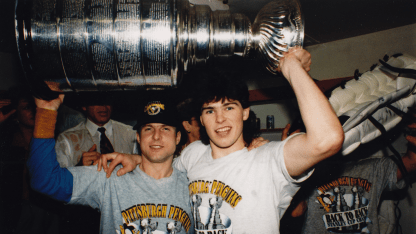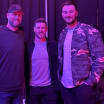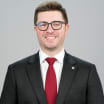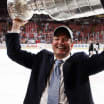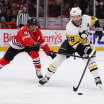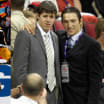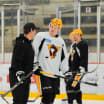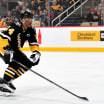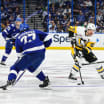Pictured above: Jiri Hrdina and Jaromir Jagr
Leading into the 1990 NHL Draft, which was held in Vancouver, all of the teams with high picks interviewed Jaromir Jagr.
He told them he wasn’t coming over to North America right away, and planned to stay in the Czech Republic for the time being. That story changed when Jagr spoke to Pittsburgh’s brass.
“When we interviewed him, he said, ‘I’ll come right away,’ because he idolized Mario Lemieux and he wanted to play with the Penguins,” said Craig Patrick, Pittsburgh’s general manager at the time. “So, he kind of lied to everybody else, and he was left open for us to pick.”
Pierre McGuire had just come on board as a special assignment scout at the time, and even now, he remembers that draft like it was yesterday. He remembers being at Pittsburgh’s draft table with Patrick; Scotty Bowman, now the winningest coach in NHL history, then the Penguins director of player personnel; “Badger” Bob Johnson, the team’s head coach; and Greg Malone, the team’s head scout.
“We always wanted Jagr; that was always the focus of what we wanted as a group,” McGuire said.
Even though the Penguins felt good about their chances, they still sat with bated breath as the draft began and the Quebec Nordiques took Owen Nolan with the first pick before Vancouver selected Petr Nedved second. After Detroit made Keith Primeau third, the Penguins believed they were in good shape, because they didn’t think Philadelphia would take Jagr (even though he believed there was a chance they might). But the Penguins were right, as the Flyers took Mike Ricci.
Patrick then stepped up to the podium and made it official.
“That was a monumental moment,” McGuire said. “Not only for the Pittsburgh Penguins, but for those of us involved in the draft that year – it was a monumental moment in our careers, it really was. Jaromir Jagr just was that iconic of player, or had the potential to be.”
Right after the draft, Jagr flew from Vancouver to Pittsburgh for a few days. During his interview for the team’s ‘Pittsburgh is Home’ 50th-anniversary documentary, Jagr said the Penguins were worried about both the political unrest in Czechoslovakia at the time and the possibility of having to enroll in the army for the country’s compulsory military service if he went back.
So, the Penguins would have preferred that Jagr stay in town, but he wanted to say goodbye to his family and friends, so he returned home for a few weeks. Patrick also had to go over to give a check to Jagr’s hometown team, Kladno of the Czech League, where his father was part-owner and Jaromir is now the owner today.
“Craig had connections because of his time with the U.S. Olympic team in 1980, he knew a lot of people in the Eastern Bloc,” McGuire said. “Craig did a phenomenal job… he knew that he could get Jaromir out.”
Paul Steigerwald, the Penguins radio color analyst at the time, remembers going to the airport when Jagr first arrived back in Pittsburgh.
“Jagr was standing there talking, and Barry Smith, a Penguins assistant coach, said, ‘Look at the power train on that kid!’ It was so obvious that he was built differently than anybody else,” Steigerwald said. “We later learned that he did 1,000 squats a day, so no wonder he looked like that.
“His legs, the things that powered his skating that made him a unique player the way he could protect the puck – those things were all developed in his youth, with his dad having him follow along the tractor. He would run laps with his dad, he would do squats, he would do all these different exercises to build up those muscles.”
Until then, Jagr had been so used to powering his way to the net and trying to beat goalies mostly with his backhand instead of wristing the puck or shooting off passes. So, Rick Kehoe – who had joined the Penguins coaching staff upon retiring as a player in 1986 – worked with Jagr tirelessly to expand his arsenal.
“Rick Kehoe took him on the ice and taught him to shoot one-timers, that kind of stuff. ‘Let's shoot more, shoot more,’” said Bryan Trottier, signed as a free agent to provide experience and leadership to a young team after winning four Stanley Cups with the Islanders, who also took Jagr under his wing.
“He was a student at the game. He wanted to learn the North American game and he wanted to learn it as fast as he could. So, he asked me lots of good questions. He watched. He had big ears. He listened as best he could. I’d teach him, but he wanted to learn about soft picks and give-and-go hockey, the tighter areas, and he wanted to stickhandle right into the crease before he shot.”
Jagr quickly learned how to utilize his incredible talents and skillsets through sheer determination and work ethic, working with the likes of Kehoe and Trottier, and watching Lemieux. Interestingly enough, Jaromir is an anagram for ‘Mario Jr.’
But while his game progressed on the ice, the adjustment wasn’t going quite as smoothly off the ice, despite Patrick’s best efforts from the start. Two months before training camp had begun, Patrick took Jagr to English classes downtown so that the teenager could start learning the language. “I hated (school) so much,” Jagr recalled with a grin.
Patrick had also hosted a gathering at his apartment in the city to help Jagr become familiarized with the Czechoslovakian community in Pittsburgh.
“Mario was there, a lot of the guys were there just to get him familiar with the teammates, but also a lot of Czechoslovakian people that were living here,” Patrick said. “The intent was to find him a place to live, and he found a family that he and his mother lived with for a bunch of years. So, it worked out well.”
Jagr moved in with Stefan and Olga Nemec in Homestead, who had immigrated to the United States after the Prague Spring in 1968 – with Jaromir wearing his jersey number to commemorate the failed Czechoslovakian freedom movement. They had ended up in the Pittsburgh area with help from relatives who came to America after World War I and found work in the steel industry.
Stefan and Olga’s nephew Rick Nemec characterizes his uncle and aunt as being a generation older than they actually were, which meant they ran a strict and conservative household. That benefited an 18-year-old kid like Jagr in many ways, but also made him miserable at times.
“When you're 18 years old, you want to play music and hang out and goof off when you're not playing hockey. I don't think he had a lot of freedom to do that there,” Rick said.
But Stefan and Olga did try to make Jagr feel at home, primarily through food. “My aunt, she cooked traditional,” Rick said. Trottier remembers trying one of Jagr’s favorite Czech desserts when he brought sugar buns glazed and covered with honey to the arena.
“It's like eating pure sugar, lit me up like a Christmas tree,” Trottier laughed. “And he ate like, eight of them. I had one bite and I was lit up for the whole game.”
Jagr started to become extremely affected with homesickness by November and December of his rookie year, as it was the longest he’d ever been away from his whole family, and he still struggled with the language. That’s when Patrick swung a deal to acquire Jiri Hrdina from the Calgary Flames on Dec. 13.
“The main reason we wanted him was for Jaromir because Jaromir didn’t speak very good English, and he needed somebody to help him along those lines,” Patrick said.
The importance of that trade cannot be understated, as Jagr himself has even said that it saved his hockey life.
“That might have been one of the biggest trades in franchise history, because it wasn't about Jiri Hrdina. He was great, he fit in with our team great, but it was about what he did for Jaromir,” said Kevin Stevens, a member of the 1991 and ’92 championship teams.
“Because once that happened, he was able to put his feet down. He had another guy, an older guy there he could talk to and kind of change the path of how Jaromir was even playing. It helped him be so much better, because he's just so comfortable. I think if that was not the biggest trade in our history, it's one of them, just getting Jaromir that help with that part of it. Craig Patrick was huge for Jaromir.”
A few months later, Jagr was lifting the Stanley Cup, smiling ear to ear as he shared it with not just his teammates, but his parents. It turned out to be an incredible start to a Hall of Fame career, with Jagr going on to become famous for his longevity.
But even with Jagr celebrating his 52nd birthday yesterday (Feb. 15), in a way, it feels like he hasn’t aged a day in Trottier’s eyes.
“Jaromir kind of pulled us all together into that Czechoslovakian world of his and the joy that he had, his heavy accent just didn't ever go away,” Trottier said. “We saw him obviously become more mature, and all of a sudden there's a little gray hair sticking out of the whiskers and we're like, ‘Oh my God, he's not a young man, he's not an 18-year-old,’ but that's how I'll see him for the rest of his life. But he's Pittsburgh. I know he has that Pittsburgh blood running in him because he got to enjoy a lot of years here.”

